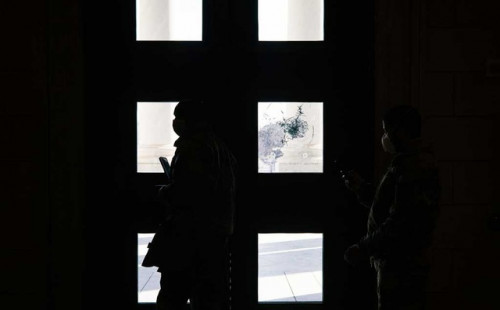The first trial seemed abstract. This one is a visceral reckoning over Trump

his was no phone call transcript, no dry words on a page open to
interpretation. This was a horde of extremists pushing over barricades and
beating police officers. This was a mob smashing windows and pounding on doors.
This was a mass of marauders setting up a gallows and shouting, “Take the
building!” and “Fight for Trump!”
As
the United States Senate opened an unprecedented second impeachment trial of
former President Donald Trump on Tuesday amid the echoes of history, the House
managers prosecuting him played powerful video images of last month’s deadly
assault on the Capitol that made abundantly clear how different this proceeding
will be from the first.
Where
the case against Trump a year ago turned on what might have seemed like an
abstract or narrow argument about his behind-the-scenes interactions with a
far-off country, Ukraine, the case this year turns on an eruption of violence
that Americans saw on television with their own eyes — and that the senators
serving as jurors experienced personally when they fled for their lives.
Rather
than a judgment of where foreign policy turns into political excess, this
sequel trial amounts to a reckoning over Trump’s very presidency. At issue in
the Senate chamber over the coming days will be many of the fundamental aspects
that defined Trump’s four years in power: his relentless assaults on truth, his
deliberate efforts to foment divisions in society, his shattering of norms and
his undermining of a democratic election.
Still,
this trial may end up with the same verdict as the last one. On a test vote on
the constitutionality of prosecuting a president after he leaves office, 44
Republicans on Tuesday stood by Trump, a measure of his enduring sway within
his party and a signal that he most likely will win the 34 votes he needs for
acquittal given the two-thirds supermajority required for conviction.
But
if the six Republicans who voted to proceed also vote to convict him for
inciting an insurrection, it will be the most senators to break from a
president of their own party in any impeachment trial in US history.
“I
would not have thought it when I was sitting on the Senate floor trying the
first impeachment — it turns out that was just the opening act,” said Norman L
Eisen, a lawyer for House Democrats during last year’s trial on Trump’s
pressure on Ukraine for political help. “The second one crystallises all the
anti-democratic elements that characterised Trump’s tenure and his Ukraine high
crimes but brings them to an even higher pitch.”
The
emotional punch of this case was evident on the Senate floor Tuesday. Sitting
in what amounted to the crime scene, the same chamber they evacuated just a
month ago moments before Trump’s supporters stormed in, some of the senators
watched raptly as the scenes of violence played out on the screens before them.
Others turned away.
The
lead House manager, Rep Jamie Raskin, choked up as he recounted bringing his
daughter and son-in-law to the Capitol that day, just a day after burying his
25-year-old son, only to have them sending farewell texts and making whispered
goodbye phone calls because “they thought they were going to die.”
“Make
no mistake about it, as you think about that day, things could have been much
worse,” said Rep. David Cicilline,, another of the managers. “As one senator
said, they could have killed all of us.”
.png)













